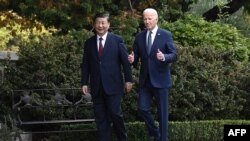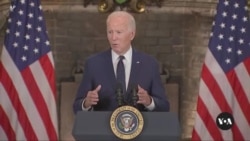U.S. President Joe Biden said he made “positive steps” during an intense hourslong meeting with Chinese President Xi Jinping Wednesday.
The two agreed to re-establish lapsed military communications, work together to assess the threats posed by artificial intelligence, and work to combat the scourge of fentanyl.
However, Biden’s off-the-cuff comment that he still sees the powerful Chinese leader as a “dictator,” revealed that the two leaders remain, in some ways, far apart.
“Well, look, he is,” Biden said, in response to a shouted question from the clamoring throng of journalists at the secluded meeting site outside of San Francisco, where 21 Asia-Pacific economies are holding a summit this week.
“He is a dictator in a sense that he is a guy that runs a country, a communist country, that’s based on a totally different form of government than ours.”
The White House chose a sprawling, bucolic estate more than an hour’s drive from San Francisco for this heavily symbolic visit covering a range of key issues that included Taiwan – the self-governing island that China claims – the possible resumption of military communications, touchy trade disagreements, the origination of fentanyl ingredients in China, and human rights issues.
The scenic grounds cover the San Andreas fault, where the Pacific and North American tectonic plates touch.
Biden said he was “candid” on these tough issues that divide the two countries – as seen in the mixed reception that residents of this diverse city gave to the Chinese leader, with both anti-communist protesters and pro-Xi greeters lining the streets. On Wednesday, groups in at least two locations descended into fisticuffs, as documented in videos posted on social media.
Xi, in his brief remarks before the leaders began their meeting, said the two nations are inextricably linked.
“For two large countries like China, the United States turning their back on each other is not an option,” he said. “It is unrealistic for one side to remodel the other. And conflict and confrontation has unbearable consequences for both sides.
I'm still of the view that major country competition is not to the prevailing trend of current times and cannot solve the problems facing China and the United States or the world at large.
Planet Earth is big enough for the two countries to succeed and one country’s success is an opportunity for the other.”
So did the presidents of the world’s two most powerful nations manage to paper over the cracks in their relationship?
Biden spoke to the press afterwards. Xi, as is his habit, did not.
The two did not release a joint statement.
“I welcome the positive steps we've taken today,” Biden said. ”And it's important for the world to see that we're implementing the approach in the best traditions of American diplomacy. We're talking to our competitors, just talking and being blunt with one another so there's no misunderstanding.”
Biden stopped far short of praising Xi, saying, “We have disagreements. He has a different view than I have on a lot of things. But he's been straight. I don't mean that good, bad or indifferent – just been straight.”
In the administration’s post-meeting readout, the White House said Biden repeated Washington’s long-held stance on Taiwan.
“President Biden emphasized that our one China policy has not changed and has been consistent across decades and administrations,” the readout said. “He reiterated that the United States opposes any unilateral changes to the status quo from either side, that we expect cross-strait differences to be resolved by peaceful means, and that the world has an interest in peace and stability in the Taiwan Strait. He called for restraint in the PRC’s use of military activity in and around the Taiwan Strait.”
Craig Singleton, a senior fellow at the Foundation for Defense of Democracies in Washington, told VOA he was struck by the leaders’ words on Taiwan.
“China often claims the U.S. is seeking to alter the status quo in the Strait,” he said. “The opposite is true. Xi's stark comments expose, yet again, his desire to speed up reunification timetables, either through military force or coercion.”
Many watching this meeting said they weren’t expecting major results, but are glad the two leaders are talking.
“This engagement, for example, between President Biden and Xi Jinping, to me it is critical because it should give a clear message that we are here to be able to work together and trust each other to resolve serious problems: Climate, issues in Ukraine or Gaza,” said Malaysian Prime Minister Anwar Ibrahim. ”There are too many contentious issues in the world and you must try and engage.”
Analysts say the success of the ongoing summit of Asia-Pacific economies – happening simultaneously in San Francisco – depends on the world’s two largest economies getting along.
“I think it’s an important meeting between President Biden and President Xi, with the primary goal of stabilizing the relationship heading into 2024,” said Michael Froman, president of the Council on Foreign Relations.
“Both for bilateral purposes but also very importantly for the broader APEC region. The countries there, the economies there, want the U.S. and China to have some kind of modus vivendi, some kind of stable relationship, particularly in anticipation of Taiwan’s election in January, the U.S. election in November.”
Biden, when asked what he told Xi about Taiwan’s elections, said: “I made clear I didn't expect any interference."
The Foundation for Defense of Democracies’ Singleton told VOA that he interpreted Xi’s words on “peaceful coexistence” differently, saying it “harkens back to Cold War-era language by Nikita Khrushchev, who promoted the notion of 'peaceful coexistence' between the U.S. and Soviet Union. Like today, previous policies aimed at stability counter-intuitively extended the Soviet system’s survival, treating the Soviet Union as an immutable juggernaut, rather than one whose demise was inevitable.”
Biden said the leaders will continue to talk. And on Thursday, they will give the other 19 Asia-Pacific economies a visual reminder of where they each stand, when the leaders pose for the so-called “family photo” — a ritual that is a hallmark of these major summits.






